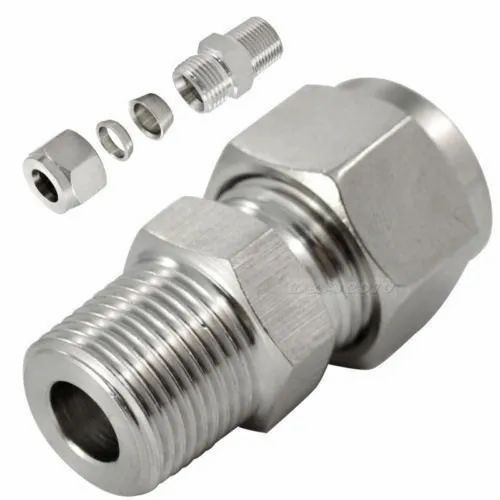A stainless steel male connector is a small but critical part of any piping or tubing system. Whether in a chemical plant, offshore platform, or manufacturing facility, its role in ensuring a leak-free and efficient flow system cannot be overstated. By selecting the correct material, grade, and design, you can maximize system safety, performance, and longevity.
A Stainless Steel Male Connector is an essential component in modern piping, tubing, and instrumentation systems. Designed to provide a secure, leak-proof connection, these connectors are widely used across industries like oil & gas, petrochemicals, power generation, pharmaceuticals, and food processing. The use of premium stainless steel grades ensures high durability, resistance to corrosion, and performance in high-pressure and high-temperature applications.
With various materials, sizes, and connection standards available, SS Male Connectors are ideal for any fluid or gas transfer system. This article covers everything you need to know about stainless steel male connectors, including types, applications, materials, grades, benefits, and installation practices.
What is a Stainless Steel Male Connector?
A male connector is a type of fitting that features an externally threaded end, designed to connect with a female-threaded counterpart. Made from high-quality stainless steel, these connectors ensure a secure and reliable joint for transferring liquids, gases, or chemicals without leakage. They are available in compression, push-to-connect, flare, and threaded designs to accommodate various industrial requirements.
Types of Stainless Steel Male Connectors
- Compression Male Connectors – Designed for joining metal or plastic tubes using a compression nut and ferrule.
- Threaded Male Connectors – Feature male threads (NPT, BSPT, BSPP, or Metric) for easy installation in piping systems.
- Flare Male Connectors – Provide a tight metal-to-metal seal, commonly used in high-pressure applications.
- Push-to-Connect Male Connectors – Allow quick and easy tube connections without tools.
- Bulkhead Male Connectors – Used for passing tubing through panels or walls, offering a secure mount.
- Elbow and Tee Male Connectors – Facilitate directional changes and branching in tubing systems.
Material Options for Stainless Steel Male Connectors
The performance of a stainless steel male connector largely depends on its material composition. Some of the widely used stainless steel grades are:
- SS 304 / 304L – Excellent corrosion resistance and cost-effective; ideal for general-purpose use.
- SS 316 / 316L – Superior resistance to chlorides and marine environments; widely used in chemical processing.
- SS 321 – Offers better high-temperature performance due to titanium stabilization.
- SS 347 – Excellent for applications involving continuous exposure to high temperatures.
- SS 904L – High alloy stainless steel with superior resistance to strong reducing acids.
- Duplex Stainless Steel (2205, 2507) – Combines strength with corrosion resistance for demanding environments.
- SS 410 / 420 – Martensitic grades offering high strength and wear resistance.
- SS 430 – Ferritic grade suitable for less aggressive environments.
For ultra-demanding industries, special alloys like Inconel, Monel, and Hastelloy are also used to manufacture male connectors, offering exceptional resistance to corrosion, oxidation, and extreme temperatures.
Applications of Stainless Steel Male Connectors
SS Male Connectors are integral to various industries due to their versatility and reliability. Typical applications include:
- Instrumentation and Control Systems
- Hydraulic and Pneumatic Systems
- Chemical and Petrochemical Processing
- Food and Beverage Industries
- Pharmaceutical and Biotech Plants
- Oil & Gas Pipelines
- Power Generation Facilities
- Marine and Offshore Equipment
- HVAC and Refrigeration Systems
- Automotive and Aerospace Applications
Benefits of Using Stainless Steel Male Connectors
- Corrosion Resistance – High-grade stainless steels provide excellent resistance to rust, oxidation, and chemical damage.
- Leak-Proof Sealing – Precision-engineered threads and sealing surfaces prevent leakage.
- High Strength and Durability – Withstand high pressure, vibration, and thermal expansion.
- Versatility – Suitable for a wide range of fluids, gases, and aggressive chemicals.
- Easy Installation and Maintenance – Compatible with standard tools and fittings.
- Compliance with Industry Standards – Available in ASTM, ASME, DIN, JIS, and ISO specifications.
